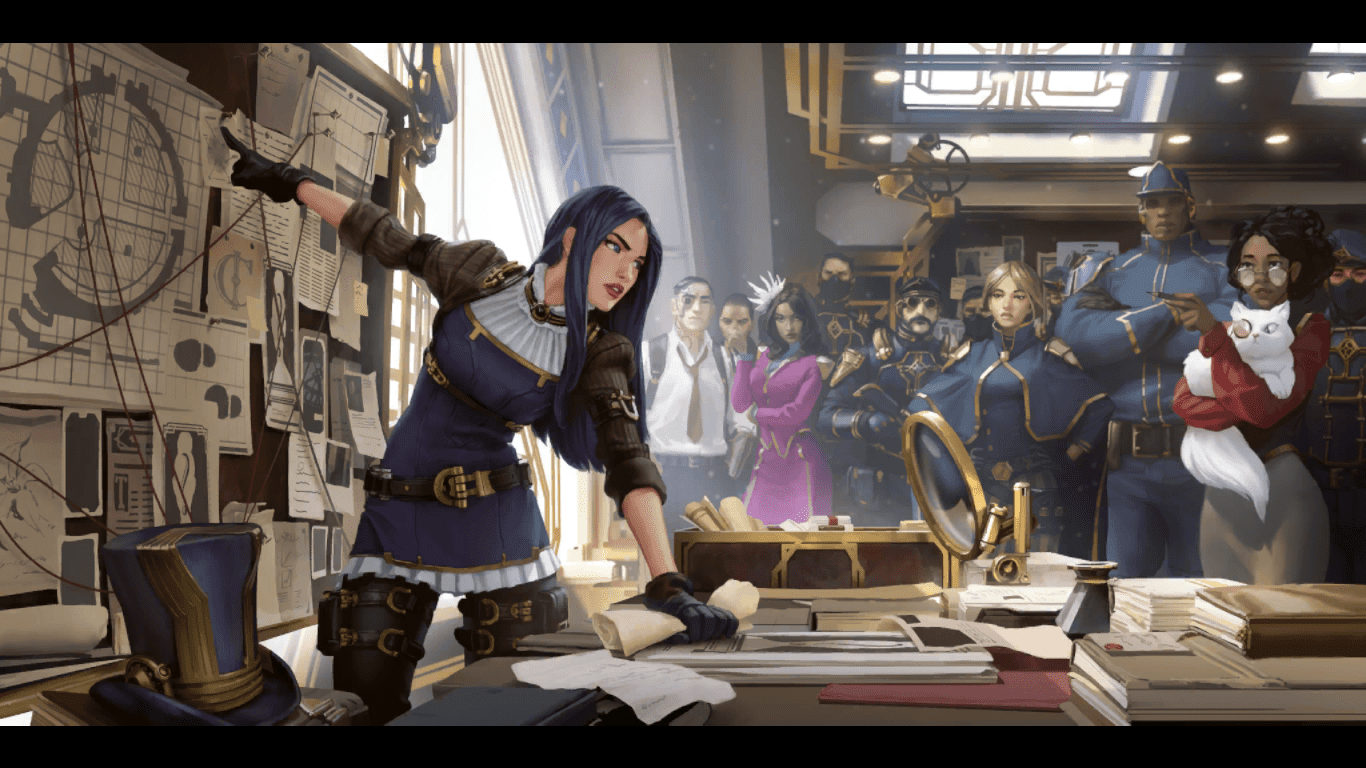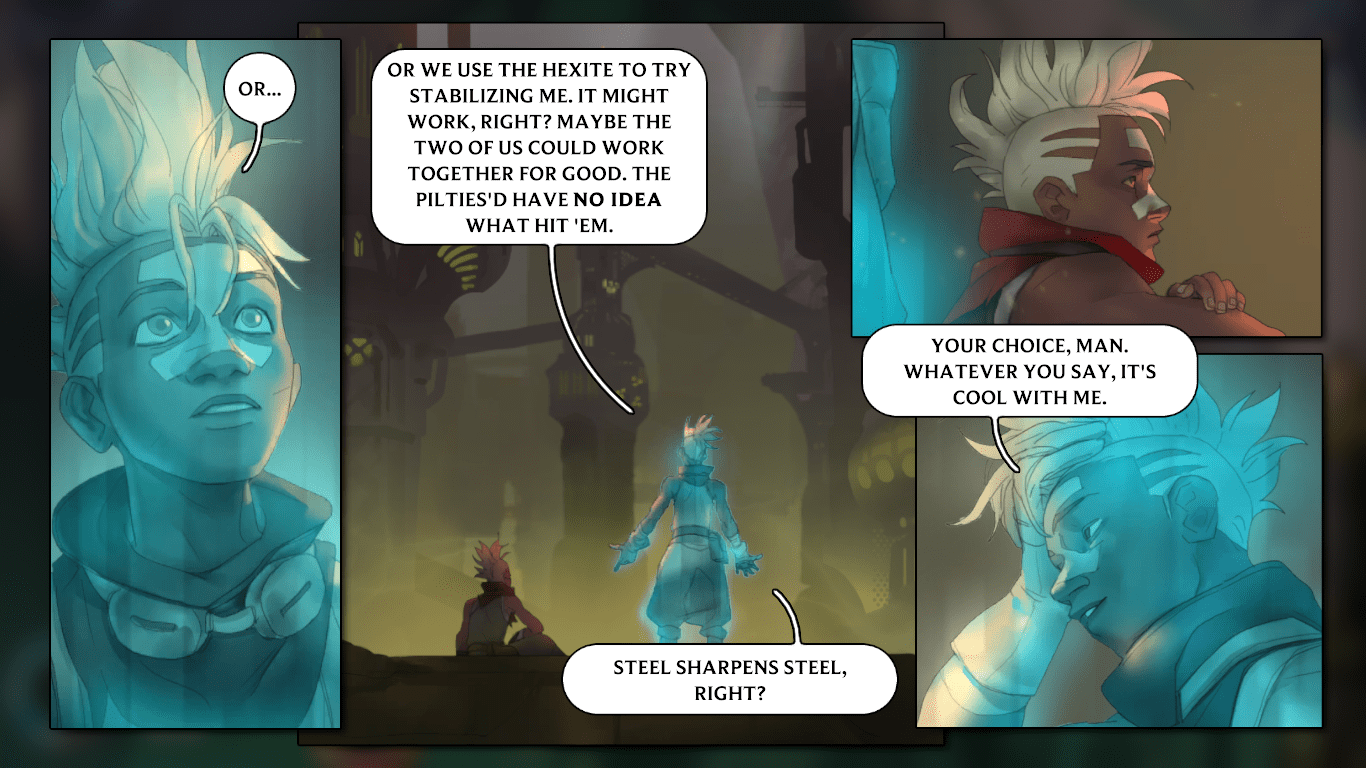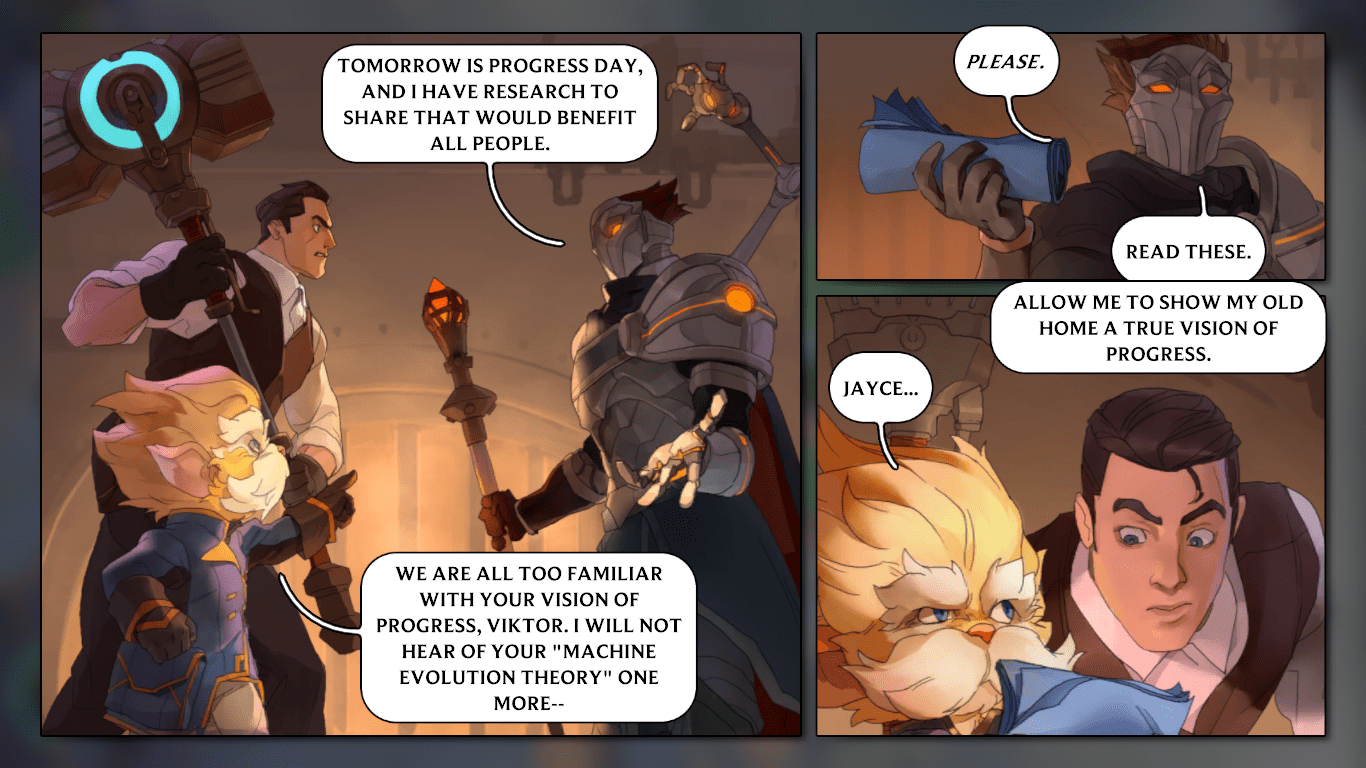NOTE: This article discusses a moral dilemma featuring some disturbing content and may not be appropriate for all readers.
Legends of Runeterra’s Path of Champions game mode is by far one of the most beloved additions to the digital card game yet. Taking the best parts of the previous player-versus-environment game modes and expanding them into one of the most fully featured single-player modes in a competitive free-to-play title ever, it’s a full-on deck-building roguelite filled with fun combos to discover and powerful bosses to vanquish. Perhaps its most unique addition to the game though is its narrative based content, as five Piltover and Zaun characters have story routes with unique artwork, voice acting, and even alternate endings. That last one in particular adds an element of replay value and allows people to discuss which endings they like the most.
However, what if instead of discussing which endings we liked, we discussed what decisions we should make?

Today I thought it would be fun to go through each of Path of Champions’ story routes and determine what the morally correct course of action is at each one’s binary choice, based as much as possible on intuitive morality, Catholic teaching, and philosophical thought. This article will spoil some or all of the story featured in each route, but fortunately the game is free and the routes are not terribly long so if you wish to play them before reading this article feel free to do so. Just keep in mind that you will need two copies of each protagonist’s champion cards to start the stories so you may need to play in other parts of the game to accrue the necessary resources to obtain them.
Jinx: The Loose Cannon
Jinx’s tale is the one playable story which is told from the perspective of an overtly unheroic character. In this regard it’s kind of ironic to try applying morality to this tale given her unstable mental state, but thankfully the choice presented is one of the easier ones. In Jinx’s tale she tracks down Caitlyn and defeats her in combat in order to gain information about the whereabouts of Vi, which the sheriff divulges to protect nearby innocents. After receiving her prize, Jinx contemplates either imprisoning Caitlyn, or ransoming her back to Piltover enforcement. Neither one of these options is exactly the most upstanding thing to do given she’s already gotten what she came for, but if we have to pick then the ransom is probably the way to go. Between losing a bit of money to a wanted criminal or leaving somebody in that criminal’s clutches, the former is innately preferable due to the priceless value of human life. And given that arguably Jinx’s most iconic line voice is: “Rules are made to be broken. Like buildings! Or people!” …I don’t think we could want to leave anyone in her clutches in good faith.
Vi, The Piltover Enforcer
Vi’s choice is probably the easiest to analyze out of all of them. In her story she descends into Zaun after being given intel on Victor going on a rampage in the undercity. Vi handily beats him, only to find that Jinx was the true cause of the mayhem and lured Vi there in order to reclaim the weapons Victor took from Jinx. Vi then decides whether to confiscate the weapons, or return them to Jinx. While it’s true that the weapons are Jinx’s property, we’ve already established that she is not exactly in the right mental state to responsibly use them, so the best thing to do is to confiscate the weapons. As Vi says later in that route, Jinx can’t use destruction as a coping mechanism to run from her problems forever, so facilitating more of it by returning the weapons is basically equivalent to supplying an addict with more of their favorite drug.
Ekko, the Boy Who Shattered Time

Now we’re getting to the interesting stuff. First some background information: In the original League of Legends game, Ekko possesses a piece of technology known as the Z-Drive which he uses to facilitate time travel, represented in that game by his ultimate ability sending him back to his location a few seconds ago in time and restoring his health, with said location being represented by an afterimage. In The Path of Champions, Ekko’s story involves an incident where an afterimage he creates gains self-awareness and goes rogue. Ekko agrees to work with the image, named “Ozzy,” to take down a Piltovan drilling operation and obtain their Hexite, but Ekko must decide whether to reset the Z-Drive or use it to give Ozzy a stable body.
Much of the moral ambiguity in this scenario comes from what we don’t understand about this technology or the conditions of this anomaly. Does Ozzy’s rational capacity point towards him having a genuine immortal soul, or is his behavior just a very accurate technological imitation of the soul? What could the long-term effects of creating a second copy of yourself be, and is it ethical to risk finding out? Has every other afterimage had the potential to be stabilized, and if so does Ekko’s previous use of them equate to some bizarre form of murder?! The debates you could have about this are endless, and in that regard I can give no authoritative answer. If I had to pick one though, it would be to reset Ozzy. Ekko is wielding powers beyond mortal ken as is, so taking actions that uphold the natural order is probably the most safe thing he can do for himself and everyone else. Plus if this anomaly kept repeating itself, who knows what ramifications a veritable community of the same person might be?
Caitlyn, the Sheriff of Piltover
Caitlyn’s story presents us with a choice that seems obvious on the surface, but is surprisingly nuanced in its ethics and gives me an opportunity to specify an element of my methodology. In this chronicle, the star sniper gets a lead on a wanted criminal named “C” who has been one of the driving motivations behind her career. While investigating, her subordinate Tremello gets taken hostage by Jinx right as C finally takes the stage. Caitlyn has to choose between pursuing C directly or taking the time to rescue Tremello. The most unique thing about this choice is that Tremello is actually a mole working to protect C, so the game frames pursuing C as the answer which reflects intelligently on the player rather than morally.
So it’s obvious then right? Just pursue C and show the game that you’re clever? Well… players who’ve seen the various endings have already noticed that I’ve decreed choices with less happy/desirable outcomes as the morally correct ones in previous sections. This is because selecting choices based on future information displays an adherence to consequentialism, the philosophical belief that the moral course of action is the one that leads to better outcomes. This might seem like a reasonable position on the surface, but ultimately I (and the Church) argues that the ends do not justify the means. For instance, if you and ten other people are hiding from a squad of enemy soldiers out for blood and you’re caring for a baby who begins to cry, it’s true that asphyxiating the child would lead to lives being saved but that doesn’t change the fact that killing a baby is an utterly monstrous course of action. There’s simply no point in chasing after happy outcomes if you have to sell your soul in order to get there, so one must not only consider the long term consequences of their actions, but also their moral short term consequences.
So what does this have to do with Caitlyn’s choice? In the case of a player who hasn’t caught on to Tremello’s allegiances then it’s a nice and easy decision to save him. But what about the player who does know the full picture? Well, given that Tremello was dragged off by Jinx we can once again point out that leaving someone in Jinx’s care is essentially gambling with their life. Tremello does escape Jinx in the pursuit route, but that’s not something Caitlyn can be sure about at the moment of the decision. So on the level of not using others’ lives as mere means, the rescue option is still the better choice. Furthermore, I think it’s perfectly logical that Caitlyn could know about Tremello’s treachery and still save him. This is because if she lost the mole, that’s an important source of testimonial evidence she would be sacrificing to get C, and considering Caitlyn’s relentless pursuit to bring C to justice it would be odd to me if she just let evidence potentially evaporate like that. Of course the game’s narrative structure cannot account for this potential scenario and thus choosing to save the sheriff’s subordinate is assumed to be an act of ignorance, but it is nonetheless another mark in favor of saving him given a more holistic view of the situation.
Jayce, the Man of Tomorrow

Finally we come to the most frustrating of all the branching choices. In Jayce’s story, the inventor prodigy is preparing a new device with Heimerdinger for a Piltovan festival known as Progress Day, and it’s revealed the finishing touches were slipped to Heimerdinger by Jayce’s archrival Victor. This was a sort of good-will token provided by Victor in order to gain a platform at the festival and share work of his own. Jacye must then decide whether to work with Victor or refuse him. What makes this choice so frustrating is that while Jayce and Heimerdinger are privy to what exactly Victor wants to share, the player can’t discover this without first agreeing to go along with it. While I could tell you what Victor’s invention is here and now (because unlike with Caitlyn, Jayce WOULD actually know what Victor’s invention is from view the blueprints, so we can use that “future” information in our decision because its not actually inaccessible to Jayce), an explanation of the two’s backstory will better support the conclusions I have come to.
Jayce’s backstory is essentially the distillation of the ideals and flaws which underpin Piltover as an entity in the world of Runeterra. An affluent child with unrivaled intellect, he got his fame through the development of transforming labor tools and attended the city-state’s most prestigious academy. Despite this, he was incapable of holding much patience with his peers since they struggled under problems that to him were trivial given his massive intellect. (Except for Victor, who tolerated Jayce’s rudeness and was more than capable of matching his pace.) Victor was an inventor from Zaun who analyzed the many perils of the undercity and isolated human error as the root of most of them. He was picked up by Piltover after he reduced workplace accidents in a local factory to zero through a variety of mechanized solutions.
Eventually the two separated themselves from one another when Victor proposed a solution to one of their projects that basically involved taking away the free will of the invention’s operator. In the conflicts and years between the two thereafter Jayce further committed himself to Piltover’s ideals, striving to empower humanity through his inventions, and work a little bit on his personality along the way to go with his recent hero status, whilst Victor worked in the shadows of Zaun on machine suppression of human weakness to bring about what he calls the “Glorious Evolution”. In essence the story of Jayce and Victor is an expression of the debates regarding transhumanism. Jayce represents an optimism recognizing that despite its flaws, humanity is uniquely capable of the ingenuity necessary for innovation, while Victor represents a misanthropic pessimism which blames humanity’s irrationalities for our suffering and seeks to cleanse us of it.
With all of that out of the way, let us return to the Path of Champions. From the Christian perspective, it’s hard to tell immediately what the right answer is because while standing opposed to things which disparage our humanity is important, the principle of second chances is pretty much literally what Christ came to teach us. However, when you consider that the invention Victor ultimately wants to share is a robot of some kind powered by the Hexcore, a powersource which has fueled much of his operations, it becomes much harder to justify granting him a reasonable benefit of the doubt. Had Victor sought to demonstrate understanding of technology that didn’t involve automatons it might be worth offering him a chance to prove he could learn to love humanity again, and thus giving him a platform would be virtuous. Ultimately though, the scenario ends up being similar to Vi’s story where going along with him only risks perpetuating the problem. And lowkey, the fact that the people Victor has helped in Zaun regard him as a messeanic figure gives me major antichrist vibes, as unlike our Lord Jesus’ redemption of humanity, Victor seeks the eradication of it.
Conclusion
So there you have it, all of the morally correct choices to make in the Path of Champions. To wrap things up I’d like to give a few words as to why I desired to make this bonus article in the first place.
The interactivity of video games makes them an excellent medium to explore moral dilemmas in a way that leaves an impression on the player, however when used improperly they can subtly move players towards less than desirable outlooks on morality. Too often are the choices assigned good and evil flags which judge the player for their decisions in an absolute sense, and while this sort of system can be used responsibly, ultimately we cannot fully trust developers to correctly show right from wrong in each scenario they produce. While as a counterpoint one could say that leaving choices ambiguous leads to moral relativism, I’d argue that such a thing is less harmful than a game actively telling you something is good while the contrary is in fact true.
Whether the developers of Legends of Runeterra intended their branching narrative system to peddle moral relativism or foster genuine consideration of right and wrong I leave up to your own interpretation. Regardless, I hope I have shown that even a simple system like this one can provide interesting conversations that tie back into humanity’s vocation to live morally. Whether you agree with me completely or think I forgot about some obscure section of the Catechism, it is my sincere wish that this topic helps you to think more critically about the choice of actions we are presented with in video games.
